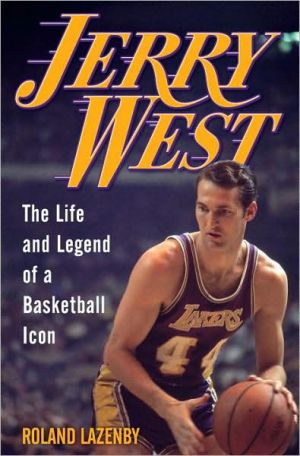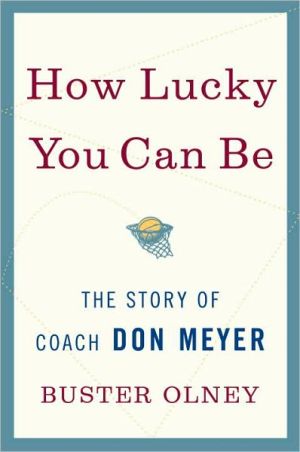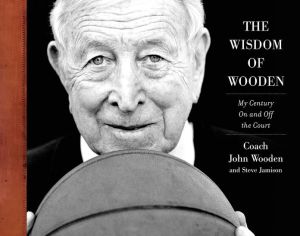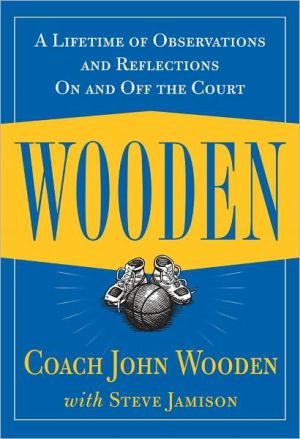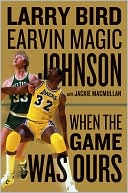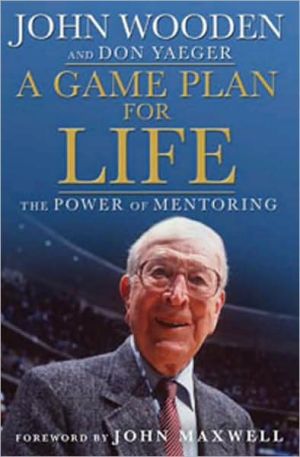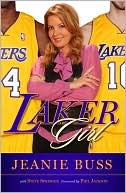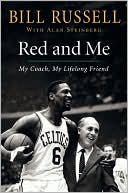Jerry West: The Life and Legend of a Basketball Icon
When in 1969 the NBA sought an emblem for the league, one man was chosen above all as the icon of his sport: Jerry West. Silhouetted in white against a red-and-blue backdrop, West’s signature gait and left-handed dribble are still the NBA logo, seen on merchandise around the world.\ In this marvelous book—the first biography of the basketball legend—award-winning reporter and author Roland Lazenby traces Jerry West’s brilliant career from the coalfields near Cabin Creek,...
Search in google:
When in 1969 the NBA sought an emblem for the league, one man was chosen above all as the icon of his sport: Jerry West. Silhouetted in white against a red-and-blue backdrop, West’s signature gait and left-handed dribble are still the NBA logo, seen on merchandise around the world. In this marvelous book—the first biography of the basketball legend—award-winning reporter and author Roland Lazenby traces Jerry West’s brilliant career from the coalfields near Cabin Creek, West Virginia, to the bare-knuckled pre-expansion era of the NBA, from the Lakers’ Riley-Magic-Kareem Showtime era to Jackson–Kobe–Shaq teams of the early twenty-first century, and beyond. But fame was not all glory.Called “Mr. Clutch,” West was an incomparable talent—flawless on defense, possessing unmatched court vision, and the perfect jumper, unstoppable when the game was on the line. Beloved and respected by fans and fellow players alike, West was the centerpiece of Lakers teams that starred such players as Elgin Baylor and Wilt Chamberlain, and he went on to nine NBA Finals. Yet in losing eight of those series, including six in a row to the detested Boston Celtics, West became as famous for his failures as for his triumphs. And that notoriety cast long shadows over West’s life on and off the court. Yet as the author discovered through scores of exclusive interviews with West’s teammates, colleagues, and family members, West channeled the frustration of his darkest moments into a driving force that propelled his years as an executive. And in this capacity, the success thatoften eluded West on the court has enabled him to reach out to successive generations of players to enrich and shape the sport in immeasurable ways.Though sometimes overshadowed by flashier peers on the court, Jerry West nevertheless stands out as the heart and soul of a league that, in fifty years, has metamorphosed from a regional sideshow into a global phenomenon. And in Jerry West, Roland Lazenby provides the ultimate story of a man who has done more to shape basketball than anyone on the planet. Publishers Weekly Going beyond the facade of the multifaceted NBA legend, Lazenby, a professor of journalism at Virginia Tech (The Show: The Inside Story of the Spectacular Los Angeles Lakers), examines West, who played for the Los Angeles Lakers from 1960 to 1974. From the frail kid from West Virginia coal country through his rebellious youthful hoopster to the crowning of a pro sports icon, this entertaining biography explicates how West, a shy, introverted perfectionist, emerged as a fabled college star with the West Virginia Mountaineers, using his patented one-hand jumper, pushing himself with endless drills to change the fate of the pro ball leagues. Lazenby accurately captures the inner man, his quirks, his rituals, his competitiveness when West, “Mr. Clutch,” faces off with Bill Russell's Celtics and Wilt Chamberlain's 76-ers. Even when the topic is life after active duty in pro ball, this book continues as a great example of old school sports bio without tabloid muck, satisfying all fans. (Apr.)
Chapter One\ \ Our grandfather wasn't much of a man.\ -Charles West\ SAGA\ Roane County, West Virginia, December 1910\ The small boy placed everything that was his, mostly a few tattered clothes, in a paper bag and set out over the hill for the long walk in the cold to a neighbor's farm. It was Christmas 1910, and his mother had just died. There had been a pine coffin and a hurried funeral, and now he was all alone. Fear and confusion welled up in his ten-year-old heart as he trudged along, holding tightly to that bag.\ For the rest of his life, Howard West would think back to that frightful day and his trek over that hill. His mother, Salena Kile West, had slipped away at age forty-one, worn down by a succession of troubled maternities amidst a world of toil. She had birthed nine children in fourteen years, a succession of labors that defined the wretchedness of subsistence farm life in rural West Virginia in the late nineteenth and early twentieth centuries. It was a life wrought with unrelenting difficulty for women in that age before rural electrification. Pregnant year after year, all the while faced with the staggering work load of a farm woman: the cooking, washing, cleaning, cutting wood, and tending stove fires seven days a week. Salena had somehow raised the brood of children needed to scratch out a life from the thin soil of the West Virginia hills in rural Roane County, northeast of Charleston. Like so many women of the period, her life had been an act played out in drudgery and isolation. Her first six pregnancies had brought the supposed blessing of six boys to help with her husband's work, but that also meant that for much of her life, she had been the only female to support a family of seven farming males.\ The troubled life of Salena Kile West sprung from circumstances all too familiar for generations of rural women. "Living was just drudgery then," a farm wife from that era recalled. "Living-just living-was a problem. No lights. No plumbing. Nothing. Just living on the edge of starvation. That was the farm life for us."\ Without electricity, all of a family's water had to be drawn by hand from either a deep well or a nearby creek. A joke of the times was that farm families had "runnin' water"-you had to run back and forth to get it. An extensive federal study of farm family life of that era said each person used an average of 40 gallons per day. That would have been 440 gallons daily for Salena Kile West's family as she neared her end. Water for cooking. Water for scrubbing the unrelenting farm dirt from clothing. Water for working those washboards that left her hands raw. Water for cleaning the small domicile that housed Salena, her husband, Maxwell "Maxie" West, and their nine children. Water for cooking to feed them all.\ Yet hauling water and cutting wood, however difficult, weren't the worst of her plight. That would have been the woodstove itself, which had to be kept roaring hot all day long, seven days a week, summer, fall, winter, and spring. Farm life-and a farm woman's exhaustion- centered on that woodstove. When it went out, the cook fire was infernally difficult to restart, thus it required constant fuel and attention, a welcome enough distraction in winter but a pitiless necessity in summer. And with no electricity and no refrigeration, the preparing and canning of vegetables and produce had to be done as they came ripe and were harvested in the heat of summer and early fall. Farm women had to get things preserved and into jars before they spoiled, just another exhaustion in farming's relentless agenda.\ In a speech before Congress, Representative John Rankin of Mississippi recalled the era and his mother "burning up in a hot kitchen and bowing down over the washtub or boiling the clothes over a flaming fire in the summer heat." Everything had to be ironed by heavy irons heated on those woodstoves, and Rankin told of seeing his mother "leaning over that hot iron hour after hour until it seemed she was tired enough to drop."\ The history of the American frontier-and make no mistake, West Virginia remained a fixture of that frontier in 1910-has been written as a man's story, yet the history itself was borne and endured by women like Salena Kile West. Likewise, the story of her grandson, Jerry West, would seem to be a man's story, yet in so many ways, his success was a product of the strong and enduring women among his forbearers.\ Stories passed down through the West family say that the birthing process over the years had been particularly hard on Salena, a typical problem of that era. One federal study said many farm women of the early twentieth century had almost no access to medical care, particularly during childbirth. As a result, a large percentage of them suffered from tears of the perineum, the area between the anus and vagina. These tears, many of which were third degree and left unrepaired, according to the report, were so bad, so painful long after birth, that it was difficult to see how farm women "managed to stay on their feet." And, of course, many didn't.\ It was this cumulative effect of the nine births and the harsh life that brought Salena to an early grave, according to family legend. She apparently continued to bleed long after the last birth. In her final exhaustion, she lay in bed as Christmas neared, worrying about her nine children: the little girls, Lula, almost two, and Thelma, three, and Sylvia; six, and her handsome collection of sons, Herman, eight, Howard, ten, Frederick, twelve, Holly, thirteen, Lee, fifteen, and Earl, sixteen. What would happen to them? Who would care for them all?\ Her husband, Maxie West, hardly inspired trust. If fact, Charles Dickens couldn't have drawn up a finer scoundrel. Maxwell West himself was a product of West Virginia's harsh farm life: Born into a family of tenant farmers in 1869, he was a working adult, a farm laborer, by age eleven, illiterate and doomed to remain that way his entire life. The harsh challenge of subsistence farm life ennobled some men; others it simply ground under and reduced to pathetic desperation, leaving them dreaming of escape from the long hours, the harsh conditions, and the many mouths to feed. According to legend, Maxie West was a coarse man cut from the wretchedness of the land. Decades after he was gone, family members would harbor passed-down memories of his teeth, badly stained brown by years of chewing and smoking tobacco, and his revolting table manners. He would eat peas with his knife, scooping them up on the blade and letting them roll into his open mouth.\ What little control Salena West had over her husband lay in the deed to their small farm. It was in her name, handed down from her family. Small West Virginia farms weren't worth a lot in those days. Although they were needed to feed the many mouths in a family, many of those tracts were valued at less than $200, according to federal records. Then again, $200 was a lot of money in rural West Virginia in 1910. The land was Salena's. And she drew some satisfaction from the idea that she would leave that farm to help sustain her brood.\ There, on her deathbed, Salena made Maxie promise that if she signed the farm over to him, he would keep the children together. Eying the deed, he promised dutifully to keep them all in his care and custody.\ Within hours of her funeral-"She wasn't even cold before he packed off those children," said granddaughter Hannah West-he made it clear that he never planned to fulfill Salena's wishes. Instead, Maxie West moved quickly to the task of parceling the children out to neighboring farms.\ "The phrase his children used later when they were adults was that he 'turned them out,' " recalled Charles West, Maxie's grandson. Apparently Maxie sold the farm quickly. He left it and his nine children behind and found work as a barber in the nearby town of Spencer.\ Records show that just six months after burying Salena, Maxie married a local woman who already had an eight-year-old boy and a ten-year- old girl of her own. This second wife, who worked as a domestic servant, soon bore Maxwell two more children.\ Records from the era don't say how or why, but Maxie's second wife died in 1915 at age thirty-eight, just a few months after giving birth to a daughter and four short years after taking up with Maxie. Just as he had done the first time he lost a spouse, he quickly abandoned his second family of motherless children by sending all four children to live on her father's farm in Roane County. Unburdened of his offspring, Maxie West would remarry twice more over the ensuing years.\ In all, Maxwell West fathered eleven children, and, according to family legend, he boasted of another. In one of his marriages, an underage stepdaughter in her early teen years became pregnant, and Maxie confided to relatives that her child was his. His wife soon learned Maxie's secret. Understandably outraged, she contacted authorities, and Maxie West was arrested and charged with statutory rape. Arrest and prison records in West Virginia are notoriously incomplete for that era, and no record of Maxie's incarceration has turned up, but his grandchildren heard all the family stories about him from their mothers. For decades, women in the West family would say that Maxie West was the kind of relative to be avoided. And no matter what, never leave him alone with the children.\ It was to a neighbor's farm that little Howard West trudged that week of Christmas 1910. Rolla Starcher, a sheep farmer, had agreed to take him in. Starcher, a distant cousin of Salena Kile, had been married for years to wife Bertha. Typical of the families of rural Appalachia in 1910, the Starchers' three adult children still lived with their parents on the farm. They welcomed Howard warmly into their home, and in time it would become clear that, as harsh as the circumstances were, the Starchers had saved little Howard West. His mother's death meant that he would not have to grow up in the close company of his dreadful father.\ He had to work hard on that farm, Howard West would later tell his children, but it was a good home. He would have fond memories of farm life, of chasing lambs around and playing in the fields as a boy. And every year as an adult, he would get on a bus and ride back to Roane County to visit the old Starcher homeplace. Howard's own children viewed the Starchers as the closest thing they had to grandparents on their father's side of the family. On occasion, Howard and his children would visit the grave of Selena West in a small cemetery on a remote hilltop in Roane County. The marker was primitive, and obviously her pine coffin had rotted, because the ground around the grave was sunken. But the story of her labors and privation had survived in family legend. And those who visited her felt a gratitude toward her and a sorrow about her life and the scattering of her children.\ That scattering would profoundly shape Howard West. It seems that his entire life he would retain some element of that ten-year-old making the lonely walk over that hill. Long after he was gone, his own grown children would recall his obvious longing and need for family. He would hold his small children on his lap, singing them to sleep at night with verses from "Streets of Laredo" or "Barbry Allen." He would tell them he loved them and always seemed quick to display his pride in them. At the same time, Howard West was also known for his harsh temper. He was well aware of the dark recesses of his anger and always warned his children not to test him. If you heeded that warning, you could avoid the consequences of his fire. On the other hand, if you persisted in pushing him? Well, his children said they quickly learned that challenging him could prove quite painful.\ A NOBLE BEGINNING\ His grandmother's grim tenure and death on a West Virginia farm in 1910 would seem to suggest that Jerry West descended from a pack of dirt-scratching hillbillies. Yet that was hardly the case. When the West family line arrived in America just after the seventeenth century turned, it bore the crest of English nobility: a design featuring three leopards, portending perhaps West's own catlike playing style. In fact, it's hard to imagine a more colorful lineage than that of Jerry West. His direct family tree shows an astounding array of heroes and villains, wealthy landowners and occasional paupers, soldiers and profiteers, Indian fighters and dandified gentlemen, dating from the first moments of the English settlement at Jamestown and running through some of the bloodiest days in American history.\ West's ancestors include Thomas West, the second Baron De La Warr of Wherwell Abbey in the English county of Hampshire. Thomas West claimed noble lineage but worked as a poor justice of the peace in Elizabethan England until he married into money. With financial backing, he was able to lay claim to privilege and establish himself as a baron. His son, the younger Thomas West, assumed title. This younger West, the third Baron De La Warr, was one of the financiers behind the Jamestown colony in Virginia. De La Warr, of course, would be corrupted over time into "Delaware," and Thomas West would become known as Lord Delaware. The state of Delaware, even the Delaware Indians, were named after him, based upon his claim to be the first Englishman to visit that territory.\ One of Jerry West's ancestors served as the Crown Governor of Virginia, and the line of his ancestral grandfathers became some of the wealthiest landowners on Virginia's Eastern Shore for hundreds of years. Yet another ancestral grandfather of West's was Edmund Scarborough, a notoriously rapacious colonel in Colonial Virginia and the largest landholder on the Eastern Shore. Scarborough served as speaker of the House of Burgesses. He owned a fleet of ships, which allowed him to conduct trade up and down the coast of America, including the selling of arms to Indians, who called him "Conjurer." According to the book Squires and Dames of Old Virginia by Evelyn Kinder Donaldson, Scarborough was known for his harsh temper and ruthless business practices. Supposedly, in 1671 he invited local Indians to a feast where he promised the Great Spirit would speak to them. Once the Indians had gathered, he reportedly ordered his artillery to open fire on them. That same year, Scarborough died of small pox and left his vast holdings to his children, including daughter Matilda and her husband, Lieutenant Colonel John West. Evelyn Donaldson wrote: "Edmund was tempestuous and would fight at the drop of a hat . . . Scarborough however built a dynasty in America which was heard from in every generation. He left his widow Mary Scarborough and five children very well-to-do."
\ Publishers WeeklyGoing beyond the facade of the multifaceted NBA legend, Lazenby, a professor of journalism at Virginia Tech (The Show: The Inside Story of the Spectacular Los Angeles Lakers), examines West, who played for the Los Angeles Lakers from 1960 to 1974. From the frail kid from West Virginia coal country through his rebellious youthful hoopster to the crowning of a pro sports icon, this entertaining biography explicates how West, a shy, introverted perfectionist, emerged as a fabled college star with the West Virginia Mountaineers, using his patented one-hand jumper, pushing himself with endless drills to change the fate of the pro ball leagues. Lazenby accurately captures the inner man, his quirks, his rituals, his competitiveness when West, “Mr. Clutch,” faces off with Bill Russell's Celtics and Wilt Chamberlain's 76-ers. Even when the topic is life after active duty in pro ball, this book continues as a great example of old school sports bio without tabloid muck, satisfying all fans. (Apr.)\ \ \ \ \ Library JournalProlific Lakers author Lazenby (The Show: The Inside Story of the Spectacular Los Angeles Lakers in the Words of Those Who Lived It) has crafted the best biography so far published about the compelling and even enigmatic NBA forward/guard/coach/executive Jerry West. Lazenby focuses mainly on West's playing career, including long sections on his high school and college years in his home state of West Virginia. By nature a perfectionist, West struggled with self-doubt throughout his career as a player and executive. Even during times when he was scoring 40 points per game he would still think he was playing poorly. Fans of the Lakers and the NBA in general will enjoy details of West's relationships with competitor Oscar Robertson, teammates Wilt Chamberlain and Kareem Abdul-Jabbar, and favorite recruit Kobe Bryant. One minor complaint: little space is devoted to West's time as general manager for the Memphis Grizzlies after leaving the Lakers. VERDICT Highly recommended for old-school Lakers fans and those who enjoy sports biographies. Any library collecting the history of basketball and/or sports in America should acquire this. (Photographs and index not seen.)—Todd Spires, Bradley Univ. Lib., Peoria, IL\ \ \ Kirkus ReviewsIn-depth biography of one of the NBA's greatest players and executives. Decades after the conclusion of Jerry West's career, "Mr. Clutch," the bumpkin-turned-superstar whose graceful silhouette serves as the NBA logo, is still considered one of the best players ever. Despite his star status, he often shunned the spotlight during his career. As Lazenby (Journalism/Virginia Tech Univ.; The Show: The Inside Story of the Spectacular Los Angeles Lakers in the Words of Those Who Lived It, 2005, etc.) peels back the layers of mystique surrounding his historically reticent subject, West is revealed as a peevish perfectionist whose hypercompetitive nature, which provided such an edge on the court, made him a high-strung, obstinate womanizer off it. The author painstakingly recounts West's early years growing up in West Virginia, delving into his family history and focusing in particular on his contentious relationship with his father and similarities to his mother, from whom he derived his stoicism and legendary work ethic. After considerable success in high school, West earned All-American status at West Virginia University before being drafted by the Lakers. His professional career was marked by historic personal success (14-time all-star and Hall of Famer) and agonizing team disappointment-though he won one NBA title, West's Lakers lost in the championship round eight times. A brief stint coaching the Lakers followed, but West ultimately found his post-career niche as a Lakers executive, proving to be an astute judge of talent in constructing multiple championship teams led by the likes of Magic Johnson and Kobe Bryant. Lazenby gives short shrift to West's decades of work as a scout andexecutive, however, and though the author makes a game effort, it's impossible to make West as compelling on paper as he was on the court. Lakers diehards and hoops historians should give it a shot, but others may pass. Local author promotion in Los Angeles and West Virginia. Agent: Matthew Carnicelli/Carnicelli Literary Management\ \
